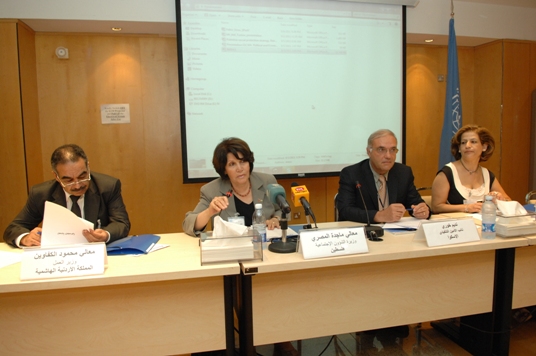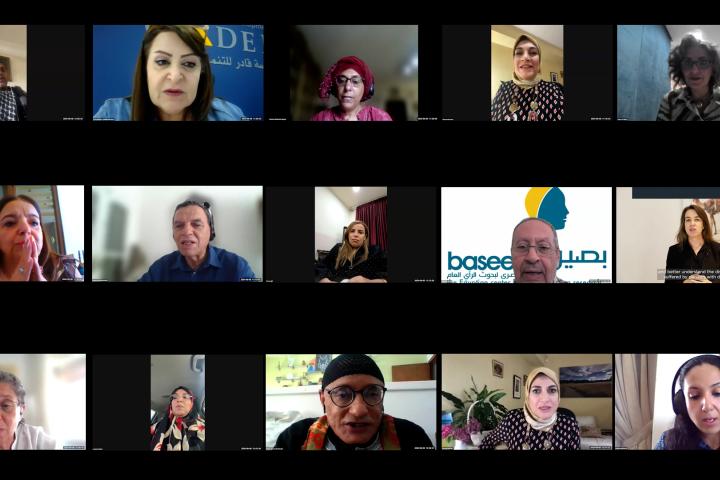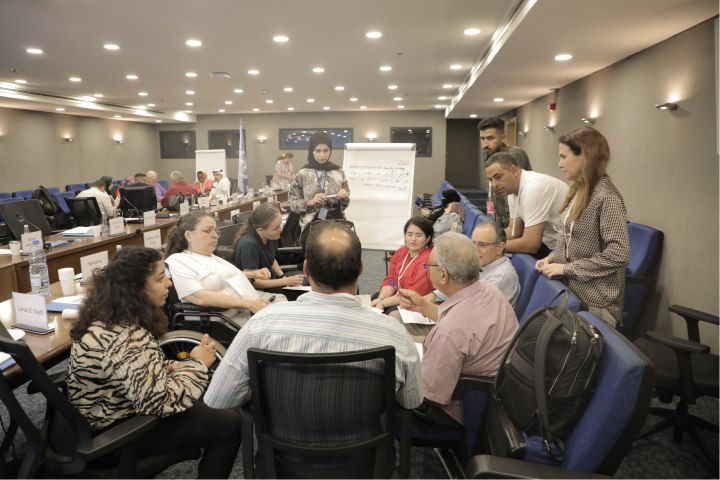ESCWA today opened a workshop on “Social Protection as Development” at the UN House in Beirut with the aim of developing effective and integrated systems in this field. The workshop’s opening was attended by Palestinian Minister of Social Affairs Magida El Masri, Jordanian Minister of Labor Mahmoud Kafawin, ESCWA Deputy Executive Secretary Nadim Khoury and Lebanese Minister of Social Affairs’ representative Randa Bou Hamdan.
In her statement, El Masri said the meeting’s topic is an urgent national priority for Palestinian people, as social protection is a leverage for social cohesion and steadfastness of Palestinians in the face of occupation policies. She added that her ministry reformulated, in cooperation with local and international partners, its programs and interventions in the fields of protection, care and prevention, empowerment of vulnerable groups of poor people, the disabled, the elderly, children, women and others. El Masri pointed out that through this workshop; the Palestinian Authority was seeking to take advantage of the expertise of ESCWA and neighboring countries in social protection. Khoury said the workshop aimed at presenting different experiences in formulating effective and integrated social protection systems that help in the development of Arab societies.
The three-day meeting also enhances South-South cooperation in order to identify innovative approaches that increase the impact of social protection programs and projects, the ESCWA official said. With the succession of global crises and the response to challenges arising from them, policymakers in the ESCWA region were reviewing social protection and assistance programs, he said. Khoury also stressed the need to arrive at a new civil contract between governments in the region and their citizens, based on freedom, justice, equity and their right to participate in the development of political and social frameworks. Kafawin spoke about the lack of precision in statistical indicators and figures in the field of social protection, in addition to confusion prevailing in the use of relevant concepts and terminology. He stressed the importance of considering social protection as a right and not charity, and said the most serious problem facing the Arab region is growing unemployment resulting not only from the lack of opportunities but also the inflow of foreign labor. The Jordanian minister said his country’s economy mainly relies on imports and its unemployment rate has reached 13.5 percent, the highest in the region, and that most of jobless Jordanians were university graduates. Kafawin stressed the need to reconsider social protection policies and programs implemented by international organizations.
ESCWA’s Regional Advisor on Social Issues Maha Yehya briefed participants about social protection services in the Arab region that are considered as charity and not rights, rendering them neither productive nor sustainable. She added that Arab people want freedom, change, and social security, and to guarantee a sustainable Arab spring. It is necessary to develop a new civil contract centered on development strategies based on equality and equity and on social protection as development for all. Yahya said the main development challenges in the region affect two main sectors: education and health. This is because social issues are approached separately from economic ones. She noted that the development divide was widening due to budget deficits, food insecurity, scarcity of water resources, and lack of social security as only 30 percent of the labor force are beneficiaries pension systems.
In the workshop, which concludes on 7 September, experts and professionals were slated to discuss challenges, successes and failures of different forms of social protection applied in countries of ESCWA, Latin America as well as Asia and the Pacific. It also aims at identifying innovative approaches for integrated social policy that combines social assistance, social security and economic empowerment, and that enhances the impact of protection programs and projects. Two separate sessions will also look into strategies for protection and social development in Palestine and ways of developing them.




